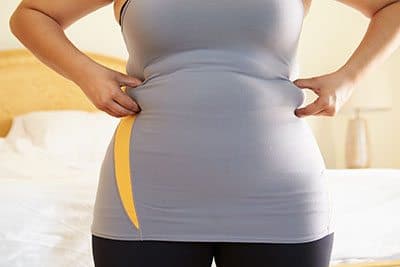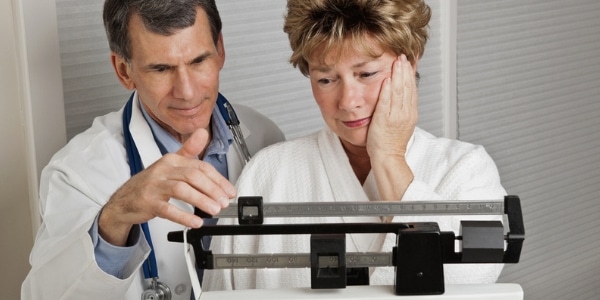Weight gain during menopause is common and may be caused by a variety of factors, including hormones and lifestyle. However, it can often be controlled with diet and exercise.
As many women age, they begin to notice the number on the scale creeping up. It is a serious issue since about 30 percent of women age 50 to 59 are obese. Why does this happen? What can be done to stop the seemingly inevitable weight gain that comes along with getting older?
What Causes Menopause Weight Gain?

Why is Weight Gain a Problem?
Research shows that weight is a contributing factor to a host of diseases that can cut your life short. A higher weight comes with an increased likelihood of diabetes, high blood pressure, high cholesterol, heart disease, and certain types of cancer. In addition to health challenges, weight gain can also impact your self-esteem.
What’s the Best Way to Avoid Gaining Weight As You Age?
Move More
Find a physical activity that you enjoy and get moving. Whether it’s jogging, Zumba, swimming or tennis, finding something you’re interested in will help exercise feel like less of a chore. Weight lifting can also help you build muscle; increased muscle helps you burn more calories.
Experts recommend that most healthy adults perform a moderate aerobic activity (like brisk walking) for at least 150 minutes per week and vigorous aerobic activity (like jogging) for at least 75 minutes per week.
Eat Right
In addition to physical activity, nutrition makes a big difference in maintaining our weight. Many women find they need 200 fewer calories per day in their 50s than in their 30s or 40s just to maintain their weight. Losing weight may require a more drastic reduction of food intake, as well as:
-Eating more fruits and vegetables. They’re higher in vitamins and nutrients and help you feel fuller longer.
-Focusing on eating protein and fiber, rather than carbohydrates. Filling up on protein rather than sweet treats will help you consume fewer calories throughout the day. Added sugars, especially those from sweet drinks and sodas, contribute about 300 calories per day to the average American’s diet. Fish, whole grains and lean meats are better options.
-Limiting alcohol. Alcohol is high in calories and low in nutrition. Try drinking water or no-calorie sparkling drinks instead.
Find Support
Consult your doctor before starting an exercise program or making any other drastic changes. He or she may have recommendations based on your unique health situation. Also, it may help to reach out to friends who may are experiencing the same challenges. Finding a diet and exercise buddy may help you stick to your goals.
Preventing weight gain during menopause requires a shift in attitude and the determination to make a permanent lifestyle change. Committing to these changes will also mean a longer life and a healthier you.


